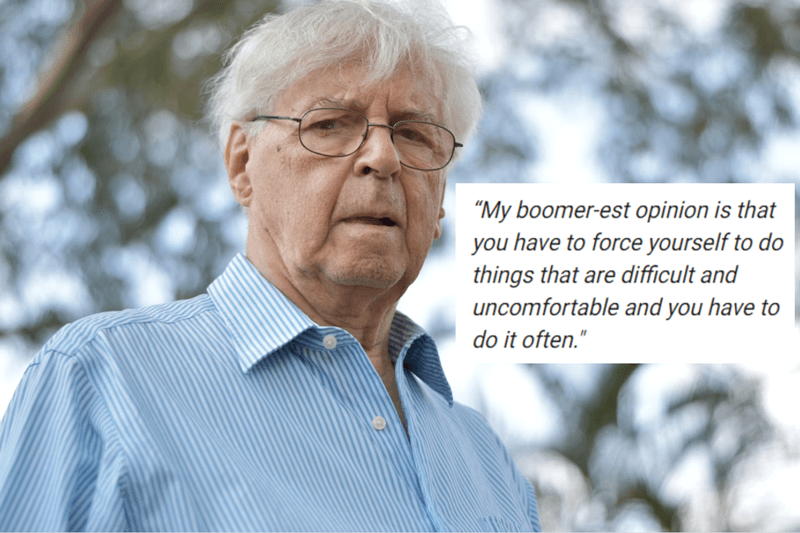17 Boomer Beliefs We Thought Were Outdated – Until We Realized They Were Right
Once upon a time, I would roll my eyes whenever my parents or grandparents dispensed their nuggets of wisdom. Yet, as the years have gone by, I find myself nodding in agreement, sometimes even quoting them verbatim.
It’s not that I’ve become old-fashioned; rather, I’ve come to appreciate the timelessness of their insights. Many of those so-called outdated beliefs hold a surprising amount of truth and relevance today.
Let’s explore 17 Boomer beliefs that, while once dismissed, have proven to have enduring value.
1. If it’s not broken, don’t fix it.

In the relentless pursuit of improvement, we often overlook the beauty of stability. The boomer belief, “If it’s not broken, don’t fix it,” resonates in a world that constantly chases the next big thing. The idea that constant change is always beneficial is a myth. Truly, there’s wisdom in recognizing when things are working just fine as they are. Whether it’s a favorite coffee maker or a trusted friendship, sometimes maintaining what works is more fruitful than seeking something new.
There’s a certain peace in understanding that not every aspect of life needs constant upheaval. This belief encourages a deeper appreciation for what we have instead of fixating on what might be better. As life speeds by, embracing this philosophy can reduce stress and increase satisfaction. Sometimes, simplicity is the ultimate sophistication.
In essence, learn to appreciate the functionality and comfort of well-working systems, and focus your energy where it’s truly needed.
2. Save for a rainy day.

The boomer mantra of saving for a rainy day carries a timeless truth that many of us ignored until reality hit. In a society driven by consumerism, the importance of financial security often takes a backseat. Yet, the simple act of setting aside a little money can be a lifesaver in uncertain times.
The wisdom of having an emergency fund goes beyond mere financial stability. It’s about peace of mind, knowing that you’re prepared for unexpected challenges. This financial cushion allows you to navigate life’s storms without sinking into debt.
Reflect on those moments when an unforeseen expense could have thrown a wrench in your life. The comfort of a well-stocked rainy-day fund transforms potential crises into manageable hiccups, proving the enduring value of this boomer belief. Embracing financial prudence can lead to a sense of empowerment and freedom.
3. Privacy is power.

In the digital age, where oversharing is the norm, the boomer belief in the power of privacy is a refreshing reminder. There’s a certain strength in keeping parts of your life away from the public eye. Not everything needs to be broadcasted or shared with the world.
Privacy allows you to preserve a part of yourself that isn’t influenced by external judgment or validation. It nurtures self-reflection, personal growth, and authentic connections. By choosing what to share and what to keep private, we maintain control over our narrative.
This belief encourages a deeper sense of self-awareness and autonomy. In a world where everyone seems to be watching, the ability to retreat into one’s own company can be empowering. It’s a gentle reminder that some of life’s most meaningful moments are best kept close to the heart.
4. Earn your way, don’t expect handouts.

The boomer belief in earning your way rather than expecting handouts might seem old-fashioned, but its relevance is undeniable. The sense of pride and accomplishment from working hard for what you achieve is unparalleled.
In today’s world, where instant gratification is rampant, this belief instills a sense of responsibility and resilience. It teaches the value of effort, persistence, and perseverance. The journey of earning something on your own terms builds not just skills but character.
Whether it’s completing a project at work or mastering a new hobby, the satisfaction derived from personal effort is deeply fulfilling. This belief is not about rejecting help but valuing the process of personal growth and contribution. It’s a clarion call to recognize the intrinsic value of hard work in shaping a gratifying life.
5. Face-to-face is better than texting.

In the era of digital communication, the boomer belief in the power of face-to-face interaction is more relevant than ever. There’s an irreplaceable warmth and authenticity in meeting someone eye-to-eye, beyond the confines of screens and emojis.
Conversations held in person allow for a comprehensive understanding of emotions through body language and tone, often missed in text messages. These interactions foster genuine connections, building trust and empathy.
The act of being present with another person, engaging in dialogue, and sharing laughter or silence creates memories that linger. It reminds us that relationships are not just about sharing information but experiencing life together. This belief encourages us to prioritize real-life connections over digital convenience.
6. You don’t have to share everything with your partner.

The boomer belief that you don’t have to share everything with your partner underscores the importance of personal boundaries, even in close relationships. It’s not about secrecy but rather maintaining individual space and identity.
Healthy boundaries in relationships foster mutual respect and understanding. They allow partners to grow as individuals while nurturing a shared connection. In a world that often equates love with constant sharing, this belief emphasizes the value of personal space.
By respecting each other’s autonomy, partners can create a balanced and fulfilling relationship. It shows that love is not about losing oneself in another but walking side by side, each with their own distinct footprints. This belief teaches us that intimacy and individuality can coexist beautifully.
7. Marriage isn’t about being happy all the time.

The boomer belief that marriage isn’t about being happy all the time but about commitment is a profound realization in today’s world. While happiness is a part of marriage, the essence lies in enduring through life’s ups and downs together.
This belief highlights the importance of commitment, resilience, and understanding in a marriage. It’s about weathering the storms and celebrating the triumphs as a team, accepting that challenges are part of the journey.
By focusing on commitment rather than constant happiness, couples can build a deeper, more resilient partnership. This belief encourages couples to nurture their bond, even when the initial excitement fades, leading to a more fulfilling and enduring relationship.
8. If you borrow it, return it in better shape.

The boomer belief in returning borrowed items in better shape than received is a timeless lesson in respect and responsibility. It emphasizes the importance of caring for others’ possessions as if they were your own.
This belief extends beyond material objects to include relationships and trust. By returning something in better condition, you convey gratitude and build goodwill. It strengthens bonds and fosters a sense of community.
In a throwaway culture, this belief reminds us of the value of integrity and respect. It encourages mindfulness and thoughtfulness towards others, leading to more meaningful interactions. This simple act of kindness can leave a lasting impression, enhancing connections and reinforcing trust.
9. Clean as you go.

The boomer belief in cleaning as you go is a practice rooted in simplicity and efficiency. By tidying up along the way, you reduce clutter and chaos, ultimately creating a more harmonious environment.
This philosophy extends beyond physical spaces to encompass mental clarity and organizational skills. It’s about taking small, consistent steps to maintain order, rather than facing overwhelming messes later.
In a fast-paced world, this belief emphasizes the importance of mindfulness and discipline. It encourages you to be present in the moment, taking responsibility for your surroundings. The result is a sense of accomplishment and peace, knowing that you can navigate life with ease and grace.
10. Don’t air your dirty laundry.

The boomer belief in not airing your dirty laundry teaches the value of privacy and discretion in personal matters. It’s about handling conflicts with dignity and respect, away from the public eye.
This belief encourages thoughtful communication and problem-solving within relationships. By keeping personal matters private, you protect both your integrity and that of those involved, fostering trust and understanding.
In a world inclined towards oversharing, this belief emphasizes the importance of maintaining a sense of decorum. It reminds us that some issues are best resolved quietly and respectfully, preserving the sanctity of relationships and personal boundaries.
11. Work first, play later.

The boomer belief in working first and playing later instills a sense of discipline and responsibility. It’s about prioritizing tasks and commitments before indulging in leisure activities.
This belief emphasizes the value of delayed gratification, where the satisfaction of completing work enhances the enjoyment of play. It teaches time management and fosters a strong work ethic, leading to personal and professional growth.
By adopting this mindset, you learn to balance responsibilities and rewards, creating a fulfilling and productive life. This belief encourages you to set goals, work diligently, and savor the fruits of your labor, leading to a sense of achievement and satisfaction.
12. You don’t need a new car—you need a paid-off one.

The boomer belief in valuing a paid-off car over a new one reflects a deeper understanding of financial stability and contentment. It’s about finding satisfaction in what you have rather than constantly seeking more.
This belief challenges the culture of consumerism, advocating for financial freedom and peace of mind. By prioritizing a debt-free lifestyle, you gain control over your finances and reduce unnecessary stress.
In a world driven by materialism, this belief encourages you to focus on what truly matters. It’s not about deprivation but about making mindful choices that lead to long-term happiness and security. Embracing this philosophy can lead to a more grounded and fulfilled life.
13. Fix it before replacing it.

The boomer belief in fixing things before replacing them emphasizes resourcefulness and sustainability. It’s a mindset that values preservation over waste, encouraging creativity and problem-solving.
This belief extends beyond physical items to relationships and commitments. By choosing to repair rather than discard, you’re fostering resilience and strengthening connections.
In a society inclined towards disposability, this belief is a call to appreciate craftsmanship and durability. It’s about recognizing the potential for renewal and growth, both in objects and in life. This mindset encourages a deeper appreciation for the things and people that enrich our lives.
14. Be kind to people who serve you.

The boomer belief in being kind to those who serve you highlights the importance of empathy and respect. It’s about acknowledging the humanity in everyone, regardless of their role or position.
This belief fosters a culture of kindness and gratitude, recognizing the efforts of those who make our lives easier. By treating service workers with dignity, you contribute to a more compassionate and connected society.
In a world often driven by self-interest, this belief is a reminder of the power of kindness. It’s about creating positive interactions that uplift both the giver and the receiver, leading to a more harmonious and understanding world.
15. Kids need structure.

The boomer belief that kids need structure underscores the importance of stability and guidance in a child’s development. It’s about creating a secure environment where children can thrive.
This belief emphasizes the role of boundaries and routines in fostering a sense of security and discipline. By providing structure, you help children develop essential life skills and confidence.
In a world that often promotes freedom without limits, this belief advocates for a balanced approach. It’s about nurturing creativity within a framework of stability, allowing children to explore while feeling safe and supported.
16. You don’t always have to like your job—you just have to show up.

The boomer belief in showing up for your job, even if you don’t always like it, underscores the importance of responsibility and perseverance. It’s about honoring commitments and recognizing that work isn’t always about passion.
This belief teaches resilience and adaptability, skills crucial for navigating life’s challenges. By showing up consistently, you build a strong work ethic and open doors to new opportunities.
In a culture that often idealizes finding your dream job, this belief encourages a balanced perspective. It’s about finding value in the present moment and understanding that every role contributes to personal growth and development.
17. Simple doesn’t mean stupid.

The boomer belief that simple doesn’t mean stupid highlights the wisdom in embracing life’s uncomplicated pleasures. It’s about finding joy in the everyday and appreciating the beauty in simplicity.
This belief encourages a focus on what’s truly important, stripping away the unnecessary complexities that often cloud our lives. It fosters mindfulness and contentment, teaching us to savor each moment.
In a fast-paced world, this belief is a reminder to slow down and appreciate the richness of simplicity. It’s about valuing experiences over possessions and finding happiness in the little things that make life meaningful.







